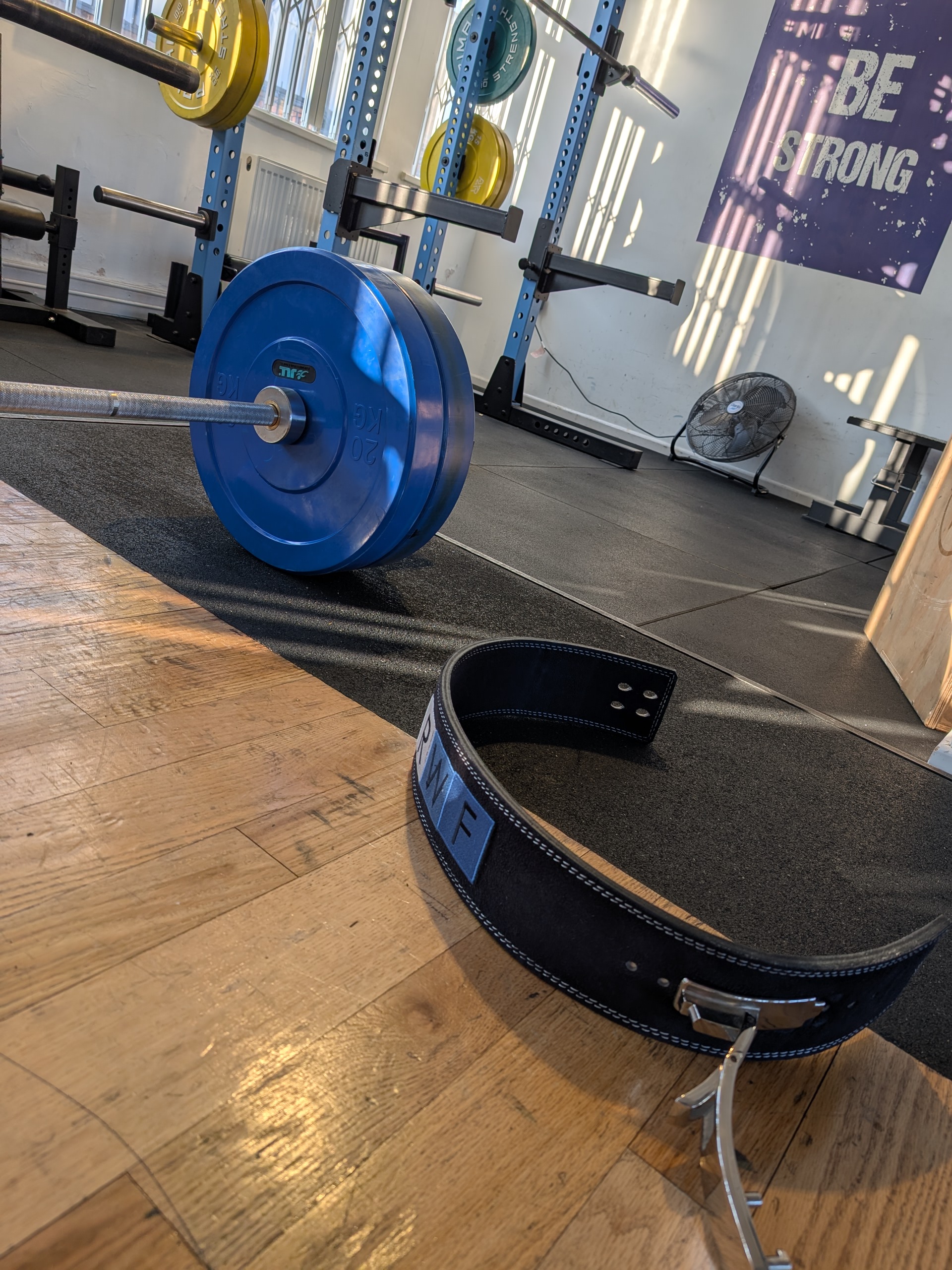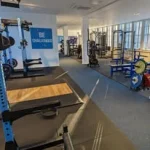Common Gym Injuries:
How to Avoid Them, and What Can You Do If You Get One
We’ve all been there. You’re training hard, feeling good… and suddenly something twinges. Most gym injuries are avoidable, but if they do crop up, knowing how to handle them makes all the difference.
At Real World Fitness, we want people to train with confidence, not fear or worry. Here’s a run through of the usual suspects, how to avoid them, and what to do if one does actually catch you out.
The Injuries We See Most Often
Here are the classic injuries we come across time and time again:
-
Strains & sprains – usually from pushing too much weight, skipping warm-ups, or using sloppy form.
-
Lower back niggles – the big one. Rounding the back when you lift is a fast track to pain.
-
Shoulder issues – rotator cuff problems and impingements often show up after too much pressing or overhead work.
-
Knees – dodgy squats, lunges, or quick direction changes can cause ligament/tendon pain.
-
Wrists & elbows – think tendonitis from endless curls, presses, or gripping wrong.
-
Ankles – sprains or instability from bad footwear or poor balance.
-
Shin splints – usually from impact or poor shoes.
-
Hamstrings – tight, under-warmed hamstrings don’t like being overloaded.
-
Overuse injuries – doing too much too soon without recovery.
-
Pulled muscles – explosive work without preparation is a recipe for this.
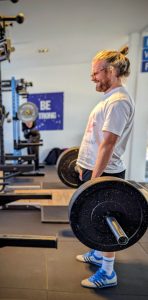
Deadlifts don’t have to be dangerous – Personal Training client Mike learning great form
How To Train Smarter and Stay Injury-Free
You don’t need to wrap yourself in bubble wrap, and you don’t need to avoid heavy lifting. You just need a bit of common sense and consistency.
-
Form first, weight second. If it feels off, stop. Don’t ego-lift.
-
Warm up properly. A few minutes of light versions of your lifts works wonders.
-
Small steps. Add weight or reps gradually. Let your body adapt.
-
Rest days matter. Sleep, food, and downtime build strength as much as lifting.
-
Listen to your body. Sharp pain? That’s your red flag. Dull aches? That’s a yellow flag. Both are worth listening to.
-
Hydrate. It sounds simple, but it helps your muscles and joints work better.
-
Kit check. Good shoes and sensible gear reduce silly mistakes.
-
Ask for help. A Personal Trainer can fine-tune your technique and give you confidence.
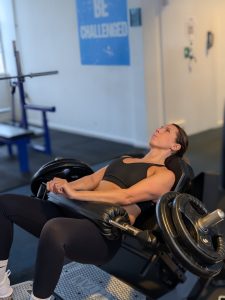
Specialist equipment like our Titan hip thrust can help injury prevention
If You Do Pick Up an Injury
Don’t panic — most injuries are minor if you deal with them early:
-
Stop making it worse (yes, that means resting, at least in the immediate aftermath).
-
Use R.I.C.E. — rest, ice, compression, elevation — where it applies.
-
Keep moving lightly once the pain calms, so you don’t seize up.
-
Build strength back steadily with rehab exercises.
-
Get support — sports massage, physio, or a PT can save you weeks of frustration.
Why Train With Us?
At Real World Fitness we keep it simple:
-
Personal Training that’s about you. Proper form, steady progress, fewer injuries.
-
Sports massage & rehab. If something goes wrong, we help get you back quicker.
-
Supportive environment. No egos, no overcrowding — just people who want to train safely and see results.
-
Capped memberships. You’ll never fight for space or risk rushing your workouts.
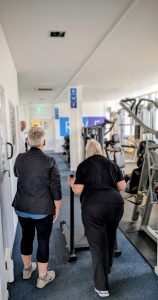
RWF PT Christine helping an older client learn to walk again
Want To Train Without the Worry?
Injuries don’t have to be part of your gym life. With the right guidance and a supportive setup, you can train harder, safer, and for longer.
👉 Grab a FREE 7-day trial at Real World Fitness
👉 Or book a FREE Personal Training session to see how we can help you train smart.
Common Gym Injuries – FAQs
What are the most common gym injuries?
Strains and sprains, lower-back niggles, shoulder impingement or rotator cuff issues, knee pain, wrist and elbow tendonitis, ankle sprains, shin splints and the occasional pulled muscle. They’re usually linked to rushed technique, loading too fast, or skipping warm-ups.
How do I avoid getting injured in the gym?
Form first, weight second. Warm up with intent, progress gradually, respect rest days, hydrate, wear sensible footwear and ask for help when you’re unsure. Training smart beats training reckless every time.
Should I train through pain?
Sharp, stabbing or worsening pain is a red flag—stop. Muscle fatigue is normal, but joint pain isn’t. Adjust the movement, reduce load, or get assessed before carrying on.
What should I do right after I pick up an injury?
Stop aggravating it, use R.I.C.E. (rest, ice, compression, elevation) where appropriate, then reintroduce light movement once the acute pain settles. Build back steadily with simple rehab work.
When should I see a professional?
If pain is sharp, swelling or weakness lingers, mobility is limited, or it’s affecting daily life—get assessed. A coach can check your form, and we can refer to physio or support with sports massage if needed.
Can sports massage actually help recovery?
Used alongside sensible training tweaks, sports massage can ease tightness, improve range of motion and help you get back to training confidently. We offer it on site in Colwick.
What’s a simple warm-up before lifting?
Two to three minutes of light cardio, joint mobility for the areas you’re training, then a couple of lighter sets of your main lift—specific and progressive.
Do I need to stop training completely while I recover?
Usually not. Swap to pain-free ranges, lighter loads or alternative movements to keep momentum without irritating the injury. Honest load management is key.
How do I know if my form is the problem?
If the same areas keep flaring up, lifts feel unstable, or you’re grinding reps with poor control—it’s a sign. A quick technique check with a coach can save you weeks of frustration.
Can a Personal Trainer help prevent injuries?
Yes. A good PT will tidy up your technique, set sensible progressions and adjust for your history—so you train harder, safer and more consistently.
Book a free Personal Training session today
If you’re in Colwick, Netherfield, West Bridgford, or anywhere else in Nottingham and you’re considering personal training, now’s your chance!
Book your FREE personal training session today and turn your fitness dreams and transformation goals into an achievable reality.
Don’t just take our word for it; feel the difference in guidance, expertise, and motivation. Nottingham residents, your journey to the best version of yourself starts with just one session.

